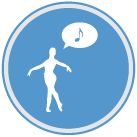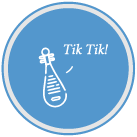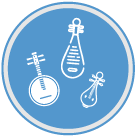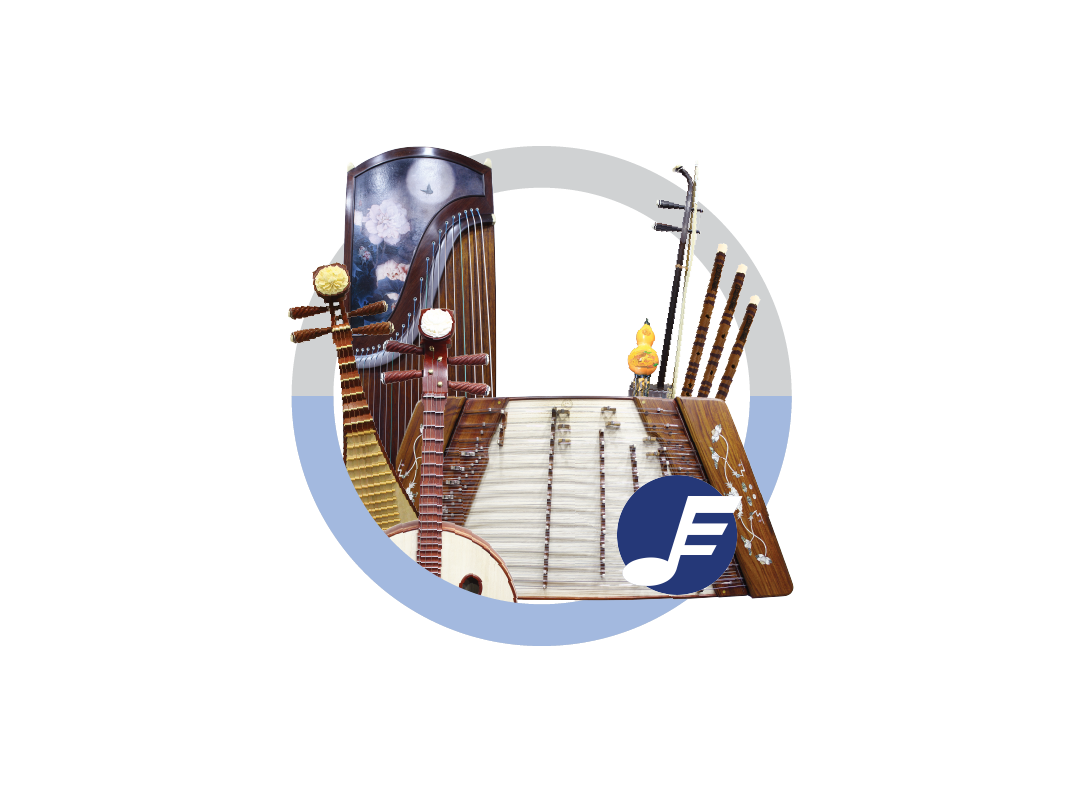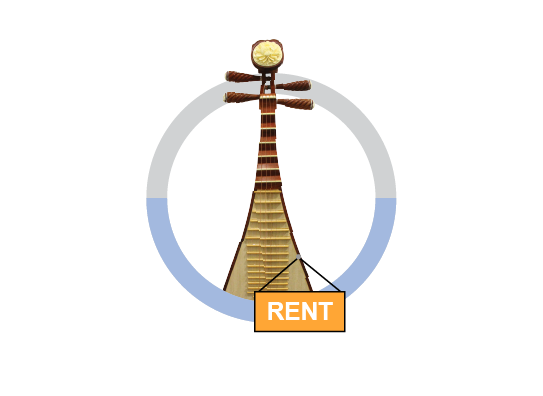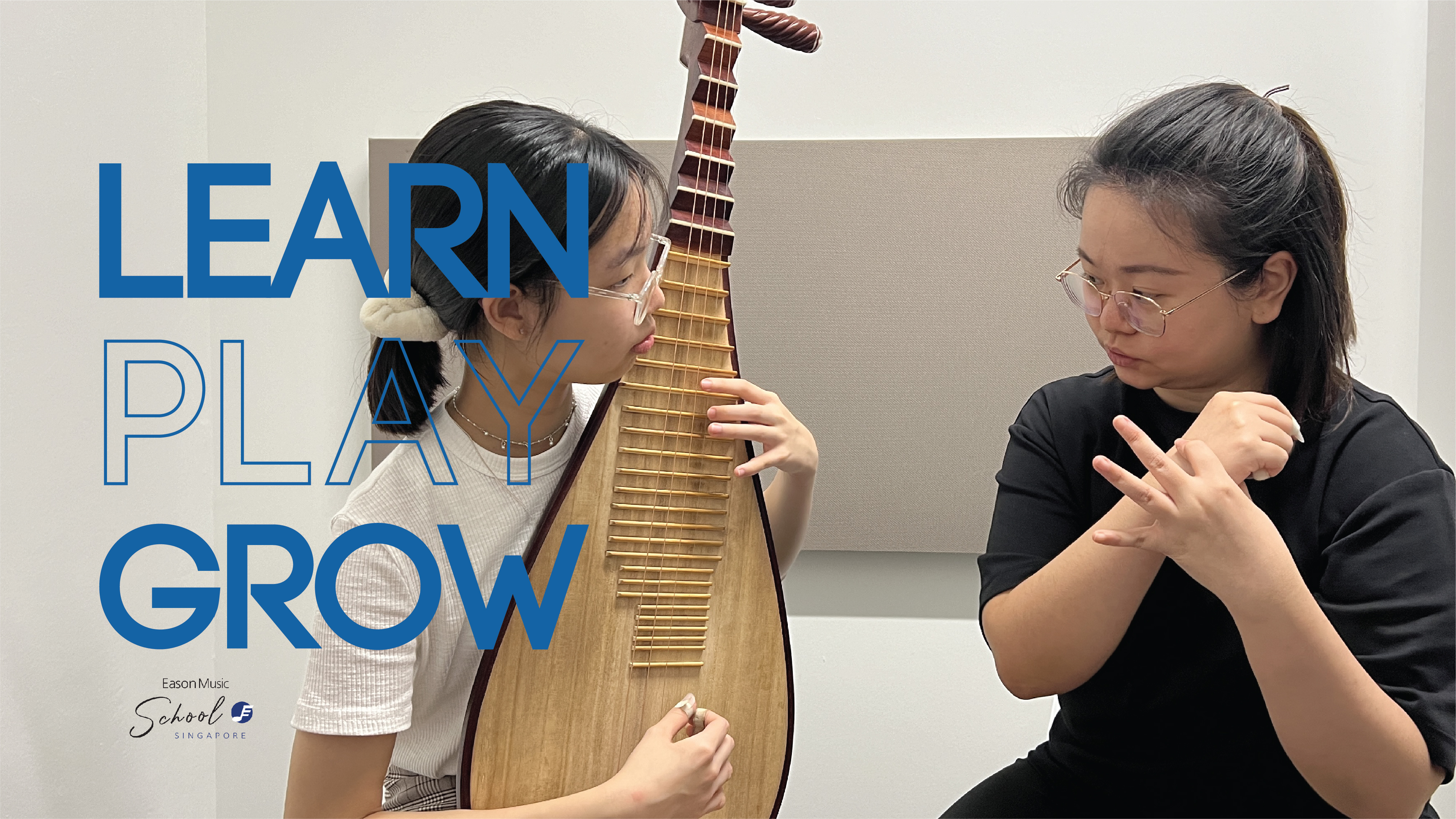
PIPA LESSONS
Looking for Pipa lessons in Singapore? You have come to the right place!
The Pipa, also known as the Chinese Lute, is one of the most complexed Chinese plucked string instrument.
It has a characteristic tone that no other instrument can replicate and the myriad of unique techniques that the pipa player uses is what gives that unique flavour. .
From mural, poetry, drama series to theatre musicals; immersed yourself in this sophisticated instrument.
Let our experienced instructors show you the proper way of the playing the Pipa!
6 Reasons To Learn Pipa
PIPA
CHINESE LUTE
An introduction to the Pipa
The Pipa (琵琶), an esteemed emblem of Chinese musical tradition, captivates audiences with its evocative melodies and exquisite artistry. Over two millennia old, this four-stringed instrument features a distinct pear-shaped body,
an elegantly carved fingerboard, and a gracefully curved neck.
Its strings, plucked or strummed by skilled hands using synthetic nails, evoke a diverse spectrum of tones, ranging from ethereal delicacy to commanding resonance, showcasing its adaptability across various musical styles. Revered in Chinese classical music, folk ensembles, and contemporary compositions, the Pipa's cultural significance is a testament to artistic finesse and enduring heritage.
WHY EASON MUSIC?
WHAT CAN YOU EXPECT?
Learning a new music instrument can sometimes feel intimidating. Sometimes, unclear goals might even discourage us from continue learning the instrument too. We acknowledge your concerns, and here are some things to look forward to while learning the Guzheng.
Beginner LevelBeginning of a new adventure
The journey begins at the Beginner Stage, where students are introduced to fundamental techniques that lay the groundwork for pipa playing. This stage emphasizes the development of posture, hand positioning, and basic finger techniques. Clear and consistent sounds are cultivated through proper plucking techniques, allowing beginners to acquaint themselves with the instrument's tonal range and musical possibilities. Basic melodies and traditional tunes serve as stepping stones, fostering a solid foundation for future skill development. The emphasis at this stage is on building the essential groundwork necessary for the pipa journey.Intermediate LevelDo more with your fingers
Advancing to the Intermediate Stage, students delve deeper into the intricacies of pipa playing. The focus shifts to mastering more complex finger techniques, including slides, bends, and vibrato, adding nuance and expressiveness to their music. Intermediate players explore a broader range of musical styles, from traditional Chinese folk music to contemporary compositions, broadening their musical palette. More challenging pieces demand increased dexterity, speed, and control, marking a crucial phase for refining technique, expanding repertoire, and gaining a deeper understanding of the instrument's versatility. The Intermediate Stage becomes a bridge between foundational learning and the nuanced artistry to come.Advanced LevelBe the master of your instrument
The pinnacle of the pipa journey is reached at the Advanced Stage, where players refine their skills to achieve a high level of mastery. Mastery of advanced techniques such as tremolo, harmonics, and intricate ornamentation elevates the musicality of performances. Advanced students delve into the art of interpretation, learning to infuse their playing with emotion and personal expression. Exploring virtuosic solo pieces and collaborative works with other instruments becomes the norm, and players may even venture into the realm of improvisation, pushing the boundaries of traditional pipa music. The Advanced Stage is characterized by the pursuit of a distinctive artistic voice and the pushing of technical boundaries, marking a profound level of accomplishment in the pipa journey.
Grading exams, solos, concerts? The world is your oyster
Eason Music provides a structured path to growth. Annual grading exams by esteemed institutions like the Nanyang Academy of Fine Arts or The TENG Company, mark significant milestones in your musical journey and allow you to understand your level of playing better. Annual student recitals offer a platform to showcase your talents and gain valuable performance experience. Students can even enter into national competitions like the Singapore Chinese Music Competition, which not only challenges your skills but also provides opportunities for recognition and networking within the global music community. The Pipa is also an integral part of the Chinese Orchestra; joining community ensembles and orchestras allows you to share your passion, refine your ensemble skills and foster a sense of community among fellow musicians.
The Pipa serves as a medium for personal expression, cultural exploration, and artistic innovation. The ongoing exploration of this enchanting musical realm becomes a lifelong pursuit of excellence and self-discovery, resonating across time and cultures through the hands and hearts of those who embrace its enchanting melodies.
Taking Pipa lessons with Eason Music is not just a pursuit of instrumental mastery; it's an journey of personal growth and musical revelation. With expert guidance, ample opportunities for performance and advancement, and a nurturing community, every note played brings you closer to the artistry of the Guzheng and the joy of creating enchanting melodies.
CHOOSE YOUR OBJECTIVES
In Eason Music we recognise that different people have different objectives when taking Pipa lessons.
Thus the choice is yours to choose to learn for leisure or for exams.
TENG NTU-CI Exam Syllabus
This stage is for Grade 1-3 (Based on Teng - CI - NTU - Chinese instrumental examination).
Grade 1 repertoire:Yi Zhi Xiao Hua Gou (一只小花狗), Feng Yang Hua Gu (凤阳花鼓), E Lun Chun Wu Qu (鄂伦春舞曲), Nan Er Dang Zi Qiang (男儿当自强)
Grade 2 repertoire:
Han Tian Lei (旱天雷), Zi Zhu Diao (紫竹调), Yang Liu Qing (杨柳青), Xi Zang Wu Qu (西藏舞曲)
Grade 3 repertoire:
Yu Er Xi Shui (鱼儿嬉水), Ma Che Fu Wu Qu (马车夫舞曲), Jin She Kuang Wu (金蛇狂舞), Ni Sang Qu Excerpt(霓裳曲- 片段)
*Progress depends on individual's efforts*
This stage is for Grade 4-6 (Based on Teng - CI - NTU - Chinese instrumental examination).
Grade 4 repertoire:San Liu (三六), Huan Re De Ri Zhi (欢乐的日子), Yang Chun Bai Xue (阳春白雪), Ying Chun Wu Qu (迎春舞曲)
Grade 5 repertoire:
Song Wo Yi Zhi Mei Gui Hua (送我一支玫瑰花), Gan Hua Hui (赶花会), Gu Xiang De Tai Yang (故乡的太阳), Fei Hua Dian Chui (飞花点翠)
Grade 6 repertoire:
Tian Shan Zhi Chun (天山之春), Han Ya Xi Shui (寒鸦戏水), Yi Zu Wu Qu (彝族舞曲), Gao Shan Liu Shui (高山流水)
*Progress depends on individual's efforts*
This stage is for Grade 7-8 (Based on Teng - CI - NTU - Chinese instrumental examination).
Grade 7 repertoire:Qin Huo Ba Jie Zhi Ye (火把节之夜), Zhong Hua Liu Ban (中花六板), Xin Fan Yu Diao Lv Yao (新翻羽调绿腰), Yi Li De Zhao Xia (伊犁的早霞)
Grade 8 repertoire:
Long Chuan (龙船), Xu Lai (虚籁), Su- Du You Gan (诉 - 读《琵琶行》有感), Chun Yu (春雨)
*Progress depends on individual's efforts*
MEET OUR PIPA TEACHERS!
A student is only as good as her teacher. We only work with qualified and dedicated teachers
Cedric Chin
Ng Bi Yu
Wang Siyuan
Pipa Lessons Information
You can opt to take Pipa lessons at our studios at CT Hub, or at the comfort of your home. Different rates apply.What Our Students Say
Need an instrument?
Of course you do! A little practise a day goes a long way.Frequently Asked Questions
Fake nails are used to play the Pipa. It would provide a consistency of sound produce on the Pipa. Different material of the fake nails can also contribute to various tone colours of the Pipa.
The fake nails are taped above our natural nails, and it acts as an extension of our nails. Special breathable medicated graded tape is used to prevent any allergies or rashes forming.
Fun fact! It would be ideal to keep your nails short for both hands. This is to prevent the strings to get in the way when you are practicing the various techniques.
Want to learn more about the Pipa?
Click the posts below!

